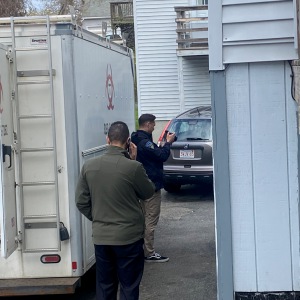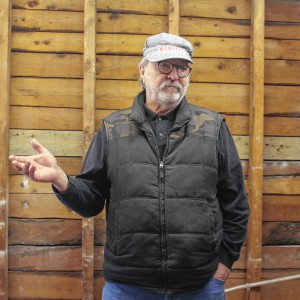Farming challenges aired at state hearing

Corn in standing water after the field was flooded off Aqua Vitae Road in Hadley. STAFF FILE PHOTO
| Published: 03-29-2024 5:18 PM |
AMHERST — Climate change’s impact on farming, as well as emerging areas like urban agriculture, soil health and pollinators, are a focus for the University of Massachusetts Extension Agriculture Program, which continues to help farmers adapt and adjust their practices.
Yet even with a growing need for assistance, Clem Clay, program director for UMass Extension Agriculture Program, said there’s been flat funding from the federal government, meaning it is more difficult for the staff to meet the needs of farmers, both in the Pioneer Valley and across the state.
“It is a real concern that the federal capacity funds are not keeping up with the times,” Clay said, addressing the 21st Century Agriculture Commission, co-chaired by Sen. Jo Comerford, D-Northampton, and Rep. Kate Hogan, D-Stow, which met at the UMass Campus Center Friday morning. This was the seventh in a series of ongoing hearings that will provide information to the panel, made up of members of the Legislature, representatives of the Healey-Driscoll administration and key members of the agriculture community, to consider opportunities for adapting programs to meet the evolving needs of farmers, such as renewable energy production, streamlining grants and reviewing extension services.
The hearing was to take testimony on technical assistance and education programs offered by the extension program in Massachusetts, as well as in other states and in Ireland, where Stan Lalor, director of Knowledge Transfer for Teagasc, Ireland’s Food & Agriculture Authority, provided in-depth information about that country’s work. This was followed by a roundtable discussion involving state Department of Agricultural Resources Commissioner Ashley Randle, and Anne Gobi, director of rural affairs, as well as representatives from the Massachusetts Farm Bureau and the Northeast Organic Farming Association.
“Farming is hard and getting harder, and that’s a challenge for us, too,” Clay said. “In general, there’s an ever-expanding mandate for our work.”
But there is also “thin capacity” and it’s a tough time to meet expectations, with concerns such as the aging infrastructure at the research farms run by UMass Extension, he said.
Unlike other extensions that have their federal money doubled or tripled by the state, Massachusetts only offers a one-to-one match, and county funding evaporated when county government was abolished in the 1990s, causing what Clay said was a “blow to our ability to be present across the state in a way we used to be.”
Another ongoing problem is that some public sector work is being funded through competitive grants, meaning that UMass Extension is competing for resources with private entities.
Article continues after...
Yesterday's Most Read Articles
 Authorities ID victim in Greenfield slaying
Authorities ID victim in Greenfield slaying
 State records show Northfield EMS chief’s paramedic license suspended over failure to transport infant
State records show Northfield EMS chief’s paramedic license suspended over failure to transport infant
 Police report details grisly crime scene in Greenfield
Police report details grisly crime scene in Greenfield
 New buyer of Bernardston’s Windmill Motel looks to resell it, attorney says
New buyer of Bernardston’s Windmill Motel looks to resell it, attorney says
 McGovern, Gobi visit development sites in Greenfield, Wendell
McGovern, Gobi visit development sites in Greenfield, Wendell
 High schools: Seventh-inning rally helps Turners Falls softball edge Frontier 6-3 (PHOTOS)
High schools: Seventh-inning rally helps Turners Falls softball edge Frontier 6-3 (PHOTOS)
While still working directly with farmers, Clay said much of UMass Extension’s work now includes online education and emails that are targeted to an interested audience during the production season. “Our website is obviously a huge attraction for growers” Clay said.
Farmers, though, put trust in what UMass Extension offers, he said, understanding that science can be effective and have an impact on how they make management decisions.
“Embracing the mission is critical to being successful in the job,” Clay said. “It all comes from believing in the science we can bring to them.”
Brian Schilling, director of Rutgers Cooperative Extension, provided details about what is done in New Jersey.
Schilling agreed with Clay that farming is hard and getting harder and that climate change poses a generational challenge for agriculture. Schilling, though, struck an optimistic tone based on the similar urbanized and suburbanized environments in the states.
“Despite the many challenges facing New Jersey, the decline of this industry is not an inevitability,” Schilling said.
High land values for farms is a barrier to entry and expansion of farms, he said, and climate resilience is an overarching theme, as well as the resources and programs for new technologies and production practices. His advice to the state panel was to understand the cumulative effect of regulations that lawmakers impose.
“Most farms are small family farms, with limited resources and know-how to deal with complicated regulatory environments,” Schilling said.
Ali Mitchell, executive director of Northeast Extension Directors, covering 12 states and District of Columbia, gave an overview of the work done by extensions at the various land grant universities. Mitchell said federal support has not kept up with inflation for the past decade, meaning their core abilities have decreased, while expectations have increased, or as she put it, “mission expansion without equal resource expansion.”
Dan Wright, the U.S. Department of Agriculture’s state conservationist for Massachusetts, outlined existing opportunities that are working, such as the Conservation Stewardship Program, which offers farmers base funding to take their farms to the next level and use modern technology, and the Environmental Quality Incentives Program, where a farmer may get help in manure storage that would otherwise pose issues off site.
Derek Costa, superintendent at Bristol County Agricultural High School, spoke about its curriculum and preparing students for the workforce, careers and post-secondary education, with an emphasis on technology resources, like its automatic robotic cow milking program and drone management for checking on crops.
Comerford said she appreciates the effort that Bristol Aggie has offered to Smith Vocational and Agricultural High School in Northampton.
“This has been an exceedingly consequential panel,” Comerford said as the two hours of testimony closed.
Scott Merzbach can be reached at smerzbach@gazettenet.com.

 What are the protocols for emergency transport of infants?
What are the protocols for emergency transport of infants? Frontier Regional School students appeal to lower voting age
Frontier Regional School students appeal to lower voting age
